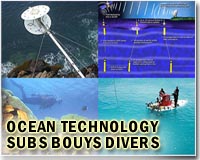| . |  |
. |
Birmingham AL (SPX) Feb 05, 2010 The increasing acidity of the world's oceans - and that acidity's growing threat to marine species - are definitive proof that the atmospheric carbon dioxide that is causing climate change is also negatively affecting the marine environment, says world-renowned Antarctic marine biologist Jim McClintock, Ph.D., professor in the University of Alabama at Birmingham (UAB) Department of Biology. "The oceans are a sink for the carbon dioxide that is released into the atmosphere," says McClintock, who has spent more than two decades researching the marine species off the coast of Antarctica. Carbon dioxide is absorbed by oceans, and through a chemical process hydrogen ions are released to make seawater more acidic. "Existing data points to consistently increasing oceanic acidity, and that is a direct result of increasing carbon dioxide levels in the atmosphere; it is incontrovertible," McClintock says. "The ramifications for many of the organisms that call the water home are profound." A substance's level of acidity is measured by its pH value; the lower the pH value, the more acidic is the substance. McClintock says data collected since the pre-industrial age indicates the mean surface pH of the oceans has declined from 8.2 to 8.1 units with another 0.4 unit decline possible by century's end. A single whole pH unit drop would make ocean waters 10 times more acidic, which could rob many marine organisms of their ability to produce protective shells - and tip the balance of marine food chains. "There is no existing data that I am aware of that can be used to debate the trend of increasing ocean acidification," he says. McClintock and three co-authors collected and reviewed the most recent data on ocean acidification at high latitudes for an article in the December 2009 issue of Oceanography magazine, a special issue that focuses on ocean acidification worldwide. McClintock also recently published research that revealed barnacles grown under acidified seawater conditions produce weaker adult shells.
Antarctica as the Ground Zero for Climate Change "The Southern Ocean is a major global sink for carbon dioxide. Moreover, there are a number of unique factors that threaten to reduce the availability of abundant minerals dissolved in polar seawater that are used by marine invertebrates to make their protective shells," McClintock says. "In addition, the increased acidity of the seawater itself can literally begin to eat away at the outer surfaces of shells of existing clams, snails and other calcified organisms, which could cause species to die outright or become vulnerable to new predators." One study McClintock recently conducted with a team of UAB researchers revealed that the shells of post-mortem Antarctic marine invertebrates evidenced erosion and significant loss of mass within only five weeks under simulated acidic conditions. McClintock says acidification also could exert a toll on the world's fisheries, including mollusks and crustaceans. He adds that the potential loss of such marine populations could greatly alter the oceans' long-standing food chains and produce negative ripple effects on human industries or food supplies over time. "So many fundamental biological processes can be influenced by ocean acidification, and the change in the oceans' makeup in regions such as Antarctica are projected to occur over a time period measured in decades," McClintock says. "Evolution simply may be unable to keep up, because it typically takes marine organisms longer periods, hundreds or even thousands of years to naturally adapt," he says. "But ocean acidification is simply happening too quickly for many species to survive unless we reverse the trend of increasing anthropogenically generated carbon dioxide that is in large part driving climate change." An expert on Antarctica, Jim McClintock, who has logged more than two dozen trips to the continent, McClintock's ongoing research explores the chemical defenses of polar marine organisms and impacts of ocean acidification on marine invertebrates. McClintock Point, located at the entrance of a three-mile stretch of land known as Explorers Cove in Antarctica, was named for the biologist in 1998.
Share This Article With Planet Earth
Related Links Antarctica at UAB Water News - Science, Technology and Politics
 Wildlife trade agency backs ban on bluefin tuna
Wildlife trade agency backs ban on bluefin tunaGeneva (AFP) Feb 5, 2010 The UN-backed wildlife trade agency said Friday it supported a proposed ban on the international trade in bluefin tuna, a delicacy in Asia, which is due to be examined by 175 countries next month. "We are recommending that the parties approve the proposals made by Monaco," said David Morgan, head of the scientific support unit at the Convention on International Trade in Endangered Species (C ... read more |
|
| The content herein, unless otherwise known to be public domain, are Copyright 1995-2010 - SpaceDaily. AFP and UPI Wire Stories are copyright Agence France-Presse and United Press International. ESA Portal Reports are copyright European Space Agency. All NASA sourced material is public domain. Additional copyrights may apply in whole or part to other bona fide parties. Advertising does not imply endorsement,agreement or approval of any opinions, statements or information provided by SpaceDaily on any Web page published or hosted by SpaceDaily. Privacy Statement |